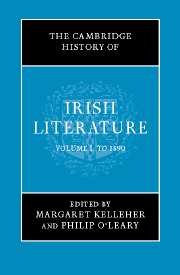Book contents
- Frontmatter
- Introduction
- 1 The literature of medieval Ireland to c. 800: St Patrick to the Vikings
- 2 The literature of medieval Ireland, 800–1200: from the Vikings to the Normans
- 3 The literature of later medieval Ireland, 1200–1600: from the Normans to the Tudors
- 4 Literature in English, 1550–1690: from the Elizabethan settlement to the Battle of the Boyne
- 5 Literature in Irish, c.1550–1690: from the Elizabethan settlement to the Battle of the Boyne
- 6 Prose in English, 1690–1800: from the Williamite wars to the Act of Union
- 7 Poetry in English, 1690–1800: from the Williamite wars to the Act of Union
- 8 Literature in Irish, 1690–1800: from the Williamite wars to the Act of Union
- 9 Theatre in Ireland, 1690–1800: from the Williamite wars to the Act of Union
- 10 Irish Romanticism, 1800–1830
- 11 Prose writing and drama in English, 1830–1890: from Catholic emancipation to the fall of Parnell
- 12 Poetry in English, 1830–1890: from Catholic emancipation to the fall of Parnell
- 13 Literature in Irish, 1800–1890: from the Act of Union to the Gaelic League
- 14 Historical writings, 1690–1890
- 15 Literature and the oral tradition
- Guide to major subject areas
- Index
- References
9 - Theatre in Ireland, 1690–1800: from the Williamite wars to the Act of Union
Published online by Cambridge University Press: 28 March 2008
- Frontmatter
- Introduction
- 1 The literature of medieval Ireland to c. 800: St Patrick to the Vikings
- 2 The literature of medieval Ireland, 800–1200: from the Vikings to the Normans
- 3 The literature of later medieval Ireland, 1200–1600: from the Normans to the Tudors
- 4 Literature in English, 1550–1690: from the Elizabethan settlement to the Battle of the Boyne
- 5 Literature in Irish, c.1550–1690: from the Elizabethan settlement to the Battle of the Boyne
- 6 Prose in English, 1690–1800: from the Williamite wars to the Act of Union
- 7 Poetry in English, 1690–1800: from the Williamite wars to the Act of Union
- 8 Literature in Irish, 1690–1800: from the Williamite wars to the Act of Union
- 9 Theatre in Ireland, 1690–1800: from the Williamite wars to the Act of Union
- 10 Irish Romanticism, 1800–1830
- 11 Prose writing and drama in English, 1830–1890: from Catholic emancipation to the fall of Parnell
- 12 Poetry in English, 1830–1890: from Catholic emancipation to the fall of Parnell
- 13 Literature in Irish, 1800–1890: from the Act of Union to the Gaelic League
- 14 Historical writings, 1690–1890
- 15 Literature and the oral tradition
- Guide to major subject areas
- Index
- References
Summary
‘For the amusement of the plundered people’: Irish theatre in 1691
Shortly before Christmas in the winter of 1691, announcements for a production of Othello at Dublin’s Smock Alley Theatre appeared in the taverns, coffee houses and printers’ shops clustered in the narrow streets between Dublin Castle and the river Liffey. For the people of Dublin, this was yet another sign of civil society re-emerging, for – like so much else in the city – Smock Alley had lain dark and empty during the three years of warfare and plague since William of Orange’s landing in England in November 1688. Anyone reading those notices would have known that reopening the theatre in the months immediately after the Treaty of Limerick involved much more than airing the musty seats and dusting off the scenery. For the audiences who made their way through the thin winter light to that production of Othello, there would have been an uncanny sense of returning to something familiar, and yet anomalous in its familiarity, for all around it had changed.
The theatre in which the play was to be performed, Smock Alley was only the second public theatre building to have been constructed in Ireland. Its predecessor had been established (probably in 1635) in Werburgh Street (just behind Dublin Castle) by the lord lieutenant of the time, Thomas Wentworth, earl of Strafford, and was managed by a member of Wentworth’s retinue, John Ogilby. Although it lasted only until 1640, the Werburgh Street Theatre was part of a culture of theatre-going in the Stuart court; Smock Alley, also built by Ogilby, was a continuation of that tradition, and had been built as part of the process of establishing a Stuart viceregal court in Restoration Dublin.
- Type
- Chapter
- Information
- The Cambridge History of Irish Literature , pp. 372 - 406Publisher: Cambridge University PressPrint publication year: 2006
References
- 1
- Cited by



